Figure 1.
Neuroendocrine mechanisms that can cause anorexia. Hormones produced by the pancreas (insulin), adipose tissue (leptin), colon (PYY3_36), and possibly metabolites (uremic factors) that accumulate in patients with CKD are long-term factors that result in anorexia. Responses to these factors result in increased activity of MC4-Rs, which suppresses AMPK activity and leads to decreased food intake, increased energy expenditure, and weight loss. MC4-R activity is increased by 2 pathways: suppression of short-term, antagonistic, orexigenic hormones NPY and AGRP; and activation of POMC-expressing neurons to produce α-MSH, which directly stimulates MC4-R. High levels of insulin, leptin, and possibly uremic metabolites can activate both pathways that stimulate MC4-R. The influence of ghrelin is less clear, as the stomach produces ghrelin when appetite rises, but this source of ghrelin appears to be less important in stimulating hunger than ghrelin that is produced in the hypothalamus. Figure modified with permission from Nature (6).

